Major Updates
Biden Administration Extends Student Loan Pause Through August 31; Signals Debt Cancellation
Citing the ongoing COVID pandemic and the economic consequences of it, Federal Student Aid (FSA) has extended the federal student loan relief to borrowers which began in March 2020 through August 31, 2022. All student loans that are federally held will have their payments automatically suspended until that date without penalty. In addition, there will be a 0% interest rate on these loans through the end of August.
In recent days, lawmakers and the Administration have been discussing the topic of student loan debt cancellation, a topic which has persisted throughout the Biden presidency. It seems like with the pause in student loan payment, the August deadline, and a potentially tricky midterm election for Democrats, there may be some movement on this issue. Democratic rank and file largely want the President to cancel $50k per borrower, not dependent on income bracket or school attended. President Biden himself however, has made comments stating he’d like a lower amount. And, in the past, he has stated it should only go to those who may be in most need, as well as that he did not think that those who attended elite institutions should be eligible, something he has seemed to move away from with comments in recent days.
The Administration has been aggressive in its approach to the relief it can provide student borrowers, having forgiven more than $17 billion since taking office on defrauded and disabled students, Public Service Loan Forgiveness, and borrowers in income driven repayment programs. Read more.
Other News
- Department of Education moves to make owners, investors, and controlling parties responsible for college and university liabilities (REGucation by Thompson Coburn LLP)
- U.S. Department of Education Announces Expansion of Second Chance Pell Experiment and Actions to Help Incarcerated Individuals Resume Educational Journeys and Reduce Recidivism (U.S. Department of Education)
This is a rather dark Dickensian time in higher education, caught in the storm of societal and economic sea change. Yet, there is hope for those institutions who recognize and respond to the changes that are upon us.
“It was the best of times, it was the worst of times, it was the age of wisdom, it was the age of foolishness.” So begins A Tale of Two Cities. So it seems to be in higher education today. Federal subsidies have helped us weather the pandemic storm so far. Some states have stepped up their support. Yet, enrollments continued the decade-long overall downward trend. As a result, the percentage of tenured/tenure-track faculty members has continued a downward trend, with only 23.7 percent of faculty members at institutions across the country tenured, and 10.2 percent on a tenure track. Meanwhile, 66.1 percent of faculty members are not part of the tenure-track system. Most of those are part-time adjunct or short-term contract employees, who, in many cases are woefully underpaid (but that is another story).
The number of traditional college-age youth will begin a significant drop in 2025, reflecting the birth-rate decline triggered by the 2008 recession. That will continue for years, followed by a pandemic-triggered drop in births thereafter. These “enrollment cliffs” are further declines on top of the current trend for high school graduates to seek alternatives to college.
It is clear that college is not meeting the great expectations of prospective full-time on-campus students as it did previously. In study after study, we see that among the top priorities of high school students and their parents for college outcomes is the expectation that they will attain a career pathway with at least a middle-class income. With artificial intelligence–driven technologies creating rapid changes in workforce needs, most colleges are not in a position to guarantee those pathways in all degree programs.
Pew Charitable Trust puts the middle income (67 percent to 200 percent of median income) at $42,000 to $125,000. Many college majors fall short of that mark. In a recent study using PayScale’s 2020 College Salary Report, 50 college majors fell below the standard, with many topping out in the $50,000 range. These include some expected areas such as the arts and social service work, but notably they also include such fields as speech and hearing disorder specialists, legal assistants, conservation biology, and medical assistants.
Meanwhile, the cost of attending college continues to rise. The average cost of college has more than doubled in the first 20 years of this 21st century, with an annual growth rate of 6.8 percent. The average cost of college in the U.S. is $35,332 per year, including tuition, books, supplies and living expenses.
No longer is four years the average length of completing a college degree. The U.S. Department of Education reports that fewer than two-thirds of all college students complete their degrees within six years. At $35,000 per year for six years, the investment tops $200,000. The cumulative current student loan debt that is financing these attempts to finish college in the United States totals $1.747 trillion.
Those are the worst of times: dropping residential undergraduate enrollment, dropping revenue due to reduced tuition funds, decreasing full-time permanent faculty and the primary traditional clientele is looking for a higher return on investment through alternative entry to careers.
Yet the best of times is also here. A huge growth in the certificate and certification market is upon us. Lindsay Daugherty, senior policy researcher at the nonprofit, nonpartisan RAND Corporation, reminds us that the traditional college degree is not the only pathway to the middle class:
There are, in fact, many pathways to the middle class, and not all of them run through four-year degree programs. Colleges, continuing education training providers, and even employers now offer an array of short-term credential programs. Most of these require fewer than two years of coursework, and offer opportunities to more or less immediately move into good jobs. Such programs grant individuals credentials like certificates, or short-term educational credentials that often come with college credit; industry certifications, in careers as varied as engineering, nursing, and human resources; and apprenticeships in fields like health care, IT, and welding.
Coursera CEO Jeff Maggioncalda predicts successful college programs will provide certificates embedded in degree programs:
Students will soon expect to be able to get both a degree and a professional certificate from their university, according to the chief executive of one of the world’s largest edtech firms, who believes that the change will be the next major development in online learning. Jeff Maggioncalda, who has run Coursera since 2017, said job-specific training courses for students, developed alongside top businesses, is the biggest growth area for his platform. Although on-campus teaching is returning post-pandemic, Mr Maggioncalda predicted that online learning is here to stay—but it will be in offering short courses for career development where companies such as his can have the most impact initially.
Maggioncalda goes on to say, “I think universities are like: ‘Whoa, we were the only game in town and now very rapidly there’s a lot of other games in town; how can I compete with them?’” His answer is “You’re going to have to change your diet—the world is profoundly changing at a rate we’ve not seen before.”
There are two communities of learners; one is experiencing the best of times; the other is experiencing the worst of times. The traditional residential program is threatened at many institutions while the continuing and professional education programs for adult learners is soaring. Who is digging deeply into the data at your institution to assess enrollments in these two communities of learners? Are they diverging? How are you adapting?
This article was originally published in Inside Higher Ed’s Transforming Teaching & Learning blog.
[…]
Jim Fong, founding director of UPCEA’s Center for Research and Strategy, said the study found neither adequate staffing nor resources focused on continuing education at these institutions. He said that the systems for the typical two- and four-year enrollment process and the continuing-ed systems aren’t necessarily tied together, adding that many institutions are using systems that were set up to cater to older generations.
“If you want to achieve those revenues, you’ve got to create a system that is as mature as the campus-based system,” Fong told Government Technology. “We’re seeing some technological challenges … a lot of folks are working off legacy systems, designed for boomers and older millennials or Gen Xers, but this generation is very different. And you’ve got to communicate to them very differently.” Read the full article.
WASHINGTON, April 14, 2022 – UPCEA, the Washington, D.C.-based association for college and university leaders in professional, continuing, and online education, is pleased to announce the election of four new officers and nine new directors to serve on the UPCEA Board of Directors. Elected in November 2021, these individuals assumed their roles at the conclusion of the 2022 UPCEA Annual Conference in Orlando, Florida on April 14, 2022.
“I am so pleased to welcome these exemplary individuals to their leadership roles on behalf of the Governance and Nominations Committee and all of UPCEA,” said Lisa Templeton, Associate Provost, Division of Ecampus at Oregon State University; 2021-2022 UPCEA President-Elect ascending to the Board President for 2022-2023, and 2021-2022 Chair, UPCEA Governance and Nominations Committee. “I look forward to working with these strong and qualified leaders during their terms, and I know that our new officers and directors will have a positive impact on both the association and our field.”
“UPCEA’s mission is vitally important to the future of higher education,” said Bob Hansen, UPCEA CEO. “Whether it is leadership in online learning or the rise of alternative credentials, the field needs a Board that is nimble, visionary, and strategic. These new officers and directors bring those attributes to the work of building a truly consequential Board.
UPCEA welcomes four officers and nine Directors At-Large to the 2022-2023 Board of Directors:
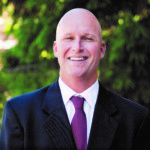 |
David Cillay, Ph.D., Chancellor, Global Campus and Vice President, Academic Outreach and Innovation (AOI) at Washington State University, will serve as Board President-Elect for a one-year term (2022-2023) and then ascend to the role of Board President (2023-2024). Dr. Cillay’s unit is responsible for Identifying, implementing, and sustaining new and innovative access options that expand the reach of Washington State University, support faculty and students in the use of academic technology, and ensure a high-quality educational experience for all students who access WSU through technology. He oversees WSU’s Global Campus, Learn365, Professional Education, and Learning Innovations.
|
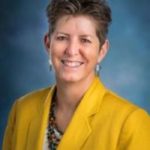 |
Kim Siegenthaler, Ph.D., Associate Provost for Online Strategies at Georgia State University, will serve as Secretary/Treasurer for a two-year term (2022-2024). Dr. Siegenthaler has 30+ years of experience in higher education as a faculty member, administrator, and distance educator. As inaugural Associate Provost for Online Strategies at Georgia State University, she advances a university-wide strategy for delivering high-quality online courses, certificate programs, degree programs and executive education to traditional and life-long learners. In 2021, she led the launch of Georgia State Online with over 80 online and hybrid program options from the associate to the doctoral level. Dr. Siegenthaler oversees the Center for Excellence in Teaching, Learning & Online Education (CETLOE) with its mission to advance the scholarship and practice of exemplary instruction at Georgia State. The center includes units for Teaching Effectiveness, Learning Analytics, Learning Community Development, Learning Design, Learning Technologies and Georgia State Online.
|
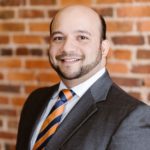 |
Asim Ali, Ph.D., Executive Director, Biggio Center for the Enhancement of Teaching & Learning at Auburn University, will serve as Network Senate Chair for a two-year term (2022-2024). The Biggio Center is a group of five units and 75 professionals that support Auburn’s academic community to enhance their careers, build engaging courses, effectively assess student learning, and implement innovative pedagogy and technologies. Earlier, Dr. Ali served as the founding Director of Auburn Online, tasked with implementing institutional strategic goals for online learning. He earned a bachelor of science in software engineering, masters in information systems management, and PhD in adult education with research focused on self-directed and technology-enhanced learning. Dr. Ali also teaches introduction to information systems management.
|
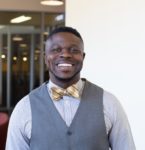 |
Jasmeial “Jazz” Jackson, Ed.D., Chief Student Success, Equity and Inclusion Officer at Thomas Edison State University, will serve as Diversity and Inclusive Excellence Committee Co-Chair for a two-year term (2022-2024). Dr. Jackson oversees advising, faculty, career services, military and veteran support, student accessibility services, tutoring services, academic integrity, and equity and inclusion within his role. He collaborates with every institutional division, ensuring a holistic, intentional student experience that equips learners with the knowledge, skills, and support they need from enrollment and beyond to achieve their academic and personal goals successfully. Dr. Jackson works on strategic teams across the university to coordinate university-wide retention initiatives. He has a Doctorate of Education in Higher Education Administration, Master of Business Administration, and a Bachelor of Science in Construction Engineering. He lives by a quote by Mahatma Gandhi, “Live as if you were to die tomorrow. Learn as if you were to live forever.”
|
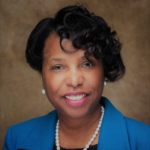 |
Tonya Amankwatia, Ph.D., Assistant Vice Provost, Distance Education and Extended Learning at North Carolina Agricultural and Technical State University, will serve as a Director At-Large for a two-year term (2022-2024). Dr. Amankwatia has been active in the larger distance education, faculty development and educational technology fields for more than 20 years. Dr. Amankwatia is a founding faculty member in UPCEA’s Online Professional Development Program and participated in numerous UPCEA programs and groups. As Assistant Vice Provost of North Carolina A&T’s Extended Campus, the PCO unit at the historically black university, she directed the approval of 6 new online programs in 2021. Dr. Amankwatia has facilitated various international, governmental, regional and corporate PCO collaborations including ones with NATO-ACT, National Cryptologic School, IBM, and AWS.
|
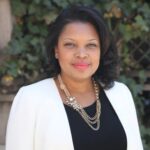 |
Tatum Thomas, Ph.D., Dean of the School of Continuing and Professional Studies (SCPS) at DePaul University, will serve as a Director At-Large for a two-year term (2022-2024). Dr. Thomas provides strategic leadership for the School’s academic and operational activities. SCPS offers undergraduate adult, graduate, and nondegree programs. In addition, its centers, and special initiatives, such as the Center for the Advancement of Adults in Education, Labor Education Center, and the Adult Men of Color Initiative emphasize access and activism. She currently serves on DePaul University’s Planning Committee for the Institute for Restorative Educational Engagement, supporting advancements in college-in-prison programs, and as a Peer Evaluator with the Middle States Commission on Higher Education. Dr. Thomas previously held administrative roles at Columbia University, New York University, and Marymount Manhattan College. Dr. Thomas holds a Doctorate in Organizational Leadership from the Chicago School of Professional Psychology, a Master’s in Higher Education Administration from Baruch College, City University of New York, a Bachelor’s in Psychology from Marymount Manhattan College, and a Certificate in Management Excellence from the Harvard Business School. Dr. Thomas is a member of Edward A. Bouchet Society.
|
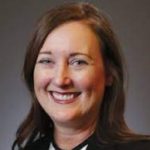 |
Andrea Carroll-Glover, M.B.A., Vice Provost of Online Strategy and Programs at Saint Mary’s University of Minnesota, will serve as a Director At-Large for a two-year term (2022-2024). In her current role, Carroll-Glover leads innovation and the advancement of online learning initiatives. Carroll-Glover has more than 20 years of executive experience with deep higher education and distance education. She has made significant online education and higher education contributions serving online and traditional universities leading online growth strategies, product innovation, marketing efforts.
|
 |
Stacy Chiaramonte, M.B.A., Associate Vice President, Graduate Studies at Worcester Polytechnic Institute, will serve as a Director At-Large for a two-year term (2022-2024). Chiaramonte is responsible for developing and implementing the strategy for student-centric education programs targeted toward part-time working professionals and other non-traditional students at WPI, as well as the implementation and execution of all online and corporate education programs. During Chiaramonte’s tenure, WPI Online has doubled the number of programs offered and grown the number of enrolled students while increasing student support and quality. Chiaramonte holds a Bachelor’s in Business Administration from the University of Massachusetts, Amherst and an MBA from Babson College.
|
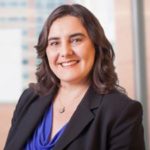 |
Yakut Gazi, Ph.D., Associate Dean, Learning Systems at Georgia Institute of Technology, will serve as a Director At-Large for a two-year term (2022-2024). Dr. Gazi’s higher education experience spans over 28 years in four countries. In her current role she oversees the design, development, delivery, and continuous improvement of Tech’s credit-bearing and professional education online courses. A recipient of the American Society of Engineering Education Continuing and Professional Development Division’s 2021 Certificate of Merit, she serves on the Academic Advisory Council for Quality Matters© and is an elected council member and First Vice President of the International Association for Engineering Continuing Education. Dr. Gazi has her Ph.D. from Texas A&M University, and an M.A. and a B.S. from Bogazici University. A Turkish-American, Dr. Gazi is married, with a daughter.
|
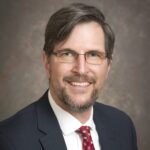
|
George Irvine, Ph.D., Associate Vice Provost for Professional and Continuing Studies and Online Initiatives at University of Delaware, will serve as a Director At-Large for a two-year term (2022-2024). Dr. Irvine leads the Division of Professional and Continuing Studies to annually serve approximately 14,000 online and continuing education students. In prior positions, Dr. Irvine led corporate and international programs at UD’s Lerner College of Business and Center for International Studies. Dr. Irvine has considerable international development expertise due to his work at the German Marshall Fund, IIE, and the Kenan Institute. His award-winning dissertation from UD’s Biden School focuses on the changing publicness of American research universities.
|
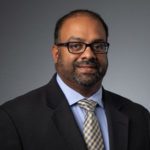 |
Shino John, M.Div., Associate VP for Strategic Growth and International Development at Rutgers University Division of Continuing Studies (DoCS), will serve as a Director At-Large for a two-year term (2021-2023). John is a leader with over 20 years of experience in higher education, and his portfolio includes continuing education for over 10,000 students and oversight of the Rutgers Makerspace, a collaborative lab environment to prototype and create academic and entrepreneurial projects with advanced design and fabrication equipment. John also chairs DoCS’ award-winning Diversity, Equity, and Inclusion (DEI) Committee and is a passionate proponent for DEI in professional, continuing, and online (PCO) education. John and the leadership of DoCS are committed to advancing DEI and inclusive excellence in the workplace through continuing education and recruiting candidates from historically underrepresented communities to fulfilling careers in PCO education. John also serves on the Board of Trustees of Pillar College, a HACU Hispanic-Serving Institution based in Newark, NJ.
|
 |
Breeda McGrath, Ph.D., Associate Campus Dean Online at The Chicago School of Professional Psychology, will serve as a Director At-Large for a two-year term (2022-2024). A higher education leader, McGrath supervises over 30 graduate programs including international psychology, organizational leadership, behavioral economics, behavior analysis, forensic psychology, counseling, and psychopharmacology. As a licensed clinical psychologist and nationally certified school psychologist, McGrath is an active member of the American Psychological Association and a school crisis prevention and intervention trainer. Originally from Ireland, McGrath collaborates with international colleagues in Indonesia, Senegal, Greece, and India, and provides consultation for immigrant rights groups. McGrath previously served as the UPCEA International Network Chair.
|
 |
Carola Weil, Ph.D., Dean of Continuing Studies and Associate Professor (CAS) at McGill University, will serve as a Director At-Large for a two-year term (2021-2023). Dr. Weil previously served in academic leadership roles in continuing education and communication/journalism studies at the University of Southern California and American University. A political scientist and policy analyst by training, with a focus on international/human security, conflict transformation, public diplomacy, and organizational development, Dr. Weil’s career has straddled public policy, nonprofit and philanthropic sectors as well as higher education, including Women In International Security, and the US Institute of Peace. A dual citizen of Germany and the US, she is multi-lingual and has served on several non-profit boards.
|
# # #
About UPCEA
UPCEA is the association for professional, continuing, and online education. Founded in 1915, UPCEA now serves most of the leading public and private colleges and universities in North America. With innovative conferences and specialty seminars, research and benchmarking information, professional networking opportunities and timely publications, we support our members’ service of contemporary learners and commitment to quality online education and student success. Based in Washington, D.C., UPCEA builds greater awareness of the vital link between adult learners and public policy issues. Visit www.upcea.edu.
Too often we assess our own learning by how pleasant the learning experience is, rather than assessing retention as well as how authentically relevantly and meaningfully those experiences and outcomes apply to real-life situations.
For nearly half of my faculty career, I taught mostly through a face-to-face lecture mode. Yes, I dabbled in simulations and games in some classes, but for the most part, in the last century from 1971 through 1995, I did little to adapt my teaching to enable students to better achieve the most meaningful outcomes. For the most part, those students were able to succeed even though I was using one of the least effective modes of teaching—oral delivery, supplemented by whiteboard. This mode required students to become auditors, transcribing what I shared and translating it into their personal context of background and applicability to their career aspirations.
It is certainly true that many of us enjoy well-formed and responsive lectures that relate well to the audience. They can be great entertainment, as well as fact-filled. It is the fine art of the sage on the stage. Yet this approach has not been proven to be the very best in building retention. As professor emeritus of communication, I know that engaging learners in active learning is superior in retention of knowledge and in applying knowledge to a wider variety of situations.
Learning by doing or simulations—especially through teaching others—has been shown to elicit better retention than merely describing a concept or action. The learning pyramid, sometimes referred to as the “cone of learning,” developed by the National Training Laboratory, suggests that most students only remember about 5 percent of what they hear in lectures and 10 percent from textbooks, but they retain nearly 90 percent of what they learn through teaching others!
“Active learning” is the term we most often apply to the foundational concepts of engaging learners in the process.
Active learning is a pedagogical technique coined by professors Charles Bonwell and James Eison in their 1991 book Active Learning: Creating Excitement in the Classroom. Bonwell and Eison argued that teaching should be less about imparting information to students via lecture-based learning and more about developing skills, while also engaging students in higher-order thinking, whether by reading or writing about the task at hand or by discussing it. Active learning refers to teaching practices that give students opportunities to work with concepts over and over, in a variety of ways and with opportunities for immediate feedback, so that knowledge can take hold in their own minds. (Top Hat)
Active learning activities can involve such activities as role-playing, problem solving, polling, debates, group work, case studies and simulations. Certainly, many aspects of internships, apprenticeships and other on-the-job work can be effective active learning when supplemented with materials or mentorship.
This approach in most cases necessitates that the educators collaborate with the professionals in the field. It is in that nexus between professor and practitioner that is more critical than ever in our rapidly changing world where technologies are driving constant innovation and reinvention. We are called upon to teach for tomorrow in an environment where the rapid development of new products and practices are driven by the scaling of artificial intelligence and digital networking.
A whole host of benefits become immediately apparent when active learning is applied. Perhaps, most important, is that the learning process moves from a one-way “professing” by the instructor to a two-way engagement among the learners and the instructor. It is in this engagement that new ideas and topics emerge, not just from the person paid to teach the class, but also from the learners who bring important perspectives, expectations, ideas, and questions to the process. The Cornell Center for Teaching Innovation describes it this way:
Active learning methods ask students to engage in their learning by thinking, discussing, investigating, and creating. In class, students practice skills, solve problems, struggle with complex questions, make decisions, propose solutions, and explain ideas in their own words through writing and discussion. Timely feedback is critical to this learning process either from the instructor or peer feedback from fellow students. Education research shows that incorporating active learning strategies into university courses significantly enhances student learning experiences (Freeman et al., 2014; Theobald et al., 2020).
A key aspect of active learning is the use of authentic assignments and assessments. The Indiana University Center for Innovative Teaching and Learning writes, “An authentic assignment is one that requires application of what students have learned to a new situation, and that demands judgment to determine what information and skills are relevant and how they should be used. Authentic assignments often focus on messy, complex real-world situations and their accompanying constraints; they can involve a real-world audience of stakeholders or ‘clients’ as well.”
There are many great websites and online tools to assist in the development of authentic assignments and assessments. Professor John Mueller of North Central College maintains one of them, the Authentic Assessment Toolbox.
This article was originally published in Inside Higher Ed’s Transforming Teaching & Learning blog.
Universities are building out continuing education teams to meet demand, but workers say they lack easy access to real-time metrics like enrollment, according to a survey released Monday by the edtech company Modern Campus and the University Professional and Continuing Education Association.
According to the report, continuing and professional education professionals see lack of resources as a barrier to addressing department goals — respondents named staffing and administrative burden as top barriers to expanding courses. But technology can help lighten the load, said Jim Fong, founding director of the association’s Center for Research and Strategy.
“There’s this foundational gap between the expectations that are being placed on continuing ed divisions to actively drive and support the transformation of their respective institutions, while at the same time they don’t have the foundational tools and resources and support that they need to do that work,” Fong told EdScoop. Read the full article.
Recent Center for Research and Strategy studies have explored different facets of today’s new learner. Explore these studies for details on how your institution can best meet new learners’ needs.
The Six Personas of the New Learner: Changing Motivations and Situations of the New Learner Landscape (with Thinking Cap)
As we move into the future, the adult learner will become more and more important. However, there are many faces to the adult learner. UPCEA collaborated with the Thinking Cap Agency to unmask some of these segments. While there are certainly older learners, professional learners and others, we focused on the Generation Z and Millennial segment of adult students. The analysis revealed that six personas that tended to fall on gender and age cohort lines. The study shows that the six personas rely on social media differently, as well as have different preferences and motivations, all of which are critical for institutions of higher education to reach and communicate more efficiently with them in the future.
Supporting & Retaining the New Professional Learner (with Salesforce.org)
Today’s new adult and professional learner is very different from past generations. However, our systems and processes to respond to students and especially inquirers have been built to previous generations. UPCEA partnered with Salesforce to better understand the intersection of people, processes and technology as it pertained to the adult learner of today and of the future. The research that we jointly conducted identified that today’s adult learner demands greater accessibility to the resources of the college or university, as well as expects immediacy and flexibility to their needs. As a result, colleges and universities need to leverage the tools of technology and automation and weave in the human element at critical junctures. This requires deliberate planning, creating a student-centered process and having a strategy for engagement.
Today’s Disengaged Learner is Tomorrow’s Adult Learner (with StraighterLine)
Over the past decade, higher education enrollments were steadily declining, but at a slow and almost unnoticeable rate, with the likely reason being increasing tuition, lower disposable household income and not necessarily a significantly improved product to justify the cost increase. Students today expect greater value and a higher return on investment. The pandemic accentuated this problem with the value equation thus forcing many students to the sidelines, primarily 18 to 22 year-olds. With over 37 million Americans with some college but no degree, higher education has an opportunity to re-capture their lost students. However, value, messaging and relationship management will have to improve. UPCEA and StraighterLine embarked on a research initiative to better understand this disengaged student to help institutions reconnect with them to help fuel a new economy and contribute in new ways to society.
